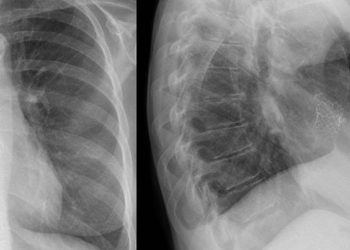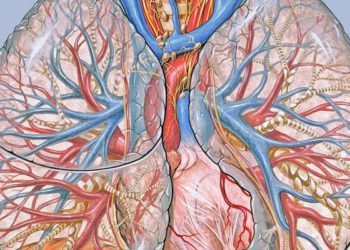Anticholinergic medications linked to worsened cognition, brain metabolism, and atrophy
1. In cognitively normal older adults, use of anticholinergic medications was linked to lower cognitive function as measured by standardized examinations, radiologic brain volume loss, and decreased glucose metabolism in areas association with cognitive function.
2. Anticholinergic medication use was linked with risk for future progression to mild cognitive impairment or Alzheimer’s disease.
Evidence Rating Level: 2 (Good)
Study Rundown: Amongst older adults, the use of anticholinergic (AC) medications has been linked to decreased cognitive function and increased risk of dementia. The described study sought to evaluate the effect of regular AC medications on brain structure and metabolism as demonstrated by MRI and FDG-PET scanning in two independent cohorts of cognitively normal older adults.
Patients using AC medication (AC+ group) demonstrated lower cognitive functioning on standard examinations of executive function, immediate memory, and general cognition compared to participants not using medium to high AC medications (AC–). The AC+ also had radiologic brain volume loss as seen on MRI and decreased glucose metabolism in areas association with cognitive function. The AC+ group demonstrated increased risk of future development of mild cognitive impairment or Alzheimer’s disease. The strength of the study included using both structural and functional endpoints, which will allow for more directed future study. The biggest weakness of the study was reliance on self-reported medication use by participants. The comparative cohorts were also unbalanced with regards to total medication use, comorbidities, and mental health condition such as anxiety and depression.
Click to read the study, published today in JAMA Neurology
Relevant Reading: Anticholinergic Medication Use and Cognitive Impairment in the Older Population: The Medical Research Council Cognitive Function and Ageing Study
In-Depth [prospective cohort]: This study examined two independent cohorts: 402 participants from the Alzheimer’s Disease Neuroimaging Initiative (ADNI) and 49 participants from the Indiana Memory and Aging Study (IMAS). There were 52 patients from the ADNI group and 8 patients from the IMAS group that were counted as AC+ (self-reported use of at least 1 month of medications with medium to high anticholinergic activity).
The AC+ group had lower mean scores on the Weschler Memory Scale-Revised Logical Memory Immediate Recall (p=0.04) and Trail Making Test Part B (p=0.04). AC+ participants demonstrated lower glucose metabolism in the hippocampus (p=0.02), and had lower scores on a global FDG-PET region of interest scale (p=0.03). For the AC+ group, MRI examinations demonstrated lower total cortical volume (p=0.02), larger lateral (p=0.01) and inferior (p<0.001) ventricle volumes, as well as lower temporal lobe cortical thickness (p=0.02). Participants in the AC+ group demonstrated increased risk of progression to mild cognitive impairment or Alzheimer’s disease after a mean of 32.1 months of follow-up.
Image: PD
©2016 2 Minute Medicine, Inc. All rights reserved. No works may be reproduced without expressed written consent from 2 Minute Medicine, Inc. Inquire about licensing here. No article should be construed as medical advice and is not intended as such by the authors or by 2 Minute Medicine, Inc.



![2 Minute Medicine: Pharma Roundup: Price Hikes, Breakthrough Approvals, Legal Showdowns, Biotech Expansion, and Europe’s Pricing Debate [May 12nd, 2025]](https://www.2minutemedicine.com/wp-content/uploads/2025/05/ChatGPT-Image-May-12-2025-at-10_22_23-AM-350x250.png)


